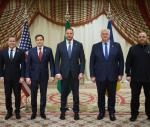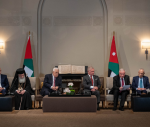You are here
Influence of religious zionism to expand with Netanyahu's coming far-right coalition
Nov 09,2022 - Last updated at Nov 09,2022
Israeli politicians from the Religious Zionism bloc which secured 14 seats in the Knesset, making it third largest, in last week's election are expected to demand potentially flashpoint ministerial posts in the government to be formed by Prime Minster Binyamin Netanyahu.
The coalition is set to be comprised of Netanyahu's Likud, ultra-Orthodox parties Shas and United Torah Judaism, and the far-right Religious Zionism bloc led by Bezalel Smotrich, which has formed an alliance with extremist Itamar Ben-Gvir's Otzma Yehudit faction. As all these parties hold a combined 64 seats in the 120-member Knesset, it is certain that Netanyahu will succeed this time around to form the government, which will be the most far-right in Israel's nearly 75-year history.
Following his first post-election meeting with Netanyahu, Ben-Gvir said that the coming colition will be "a full right-wing government" and declared "a big change is coming".
While it is not clear what ministries will be offered to Smotrich and Ben-Gvir, education, internal security have been rumoured. Netanyahu has confirmed Ben-Gvir is a candidate for an "expanded" role of the security ministry, which controls the police. In this post, he could become a major provocateur, particularly over Al Haram Al Sharif, the mosque complex in occupied Jerusalem.
Having led settlers storming the complex, Ben Gvir has called for the extension of Israeli sovereignty over the compound, unprecedented access for Israelis and Jewish prayers there. Ben Gvir and others in the Religious Zionism alliance have long pushed for changes to the status quo, under which only Muslims are allowed to worship within the compound while Jews may visit but not pray. If Ben-Gvir were to be given the security ministry, he could ignore the ban on public Jewish prayer in the compound, thereby inflaming Palestinian Muslims, Arabs and the world-wide Muslim Umma.
This could violate the understanding with Amman following Israel's occupation of East Jerusalem in June 1967. At that time, then Israeli Chief-of-Staff Moshe Dayan agreed that Jordan would continue to be custodian of Islamic and Christian sites in Jerusalem. Under this deal, non-Muslims are not permitted to perform religious rituals or display religious symbols in these sites.
Non-Muslims could visit the Haram, which Jews claim is the site of their first and second temples, under the supervision of the Waqf, the joint Palestinian-Jordanian Islamic trust which manages the mosque complex.
According to Israeli historian Amnon Ramon, Dayan sought to "to neutralise...the religious aspect of the Israeli-Arab conflict". He feared an Israeli-Jewish take-over of the management of Al Haram Sharif could provoke an uprising in the occupied Palestinian territories and a backlash in Muslim countries already shocked and angered over Israel's conquest of East Jerusalem, the West Bank and Gaza.
The idea of a status quo agreement for Muslim and Christian holy sites in Israeli-occupied Jerusalem has a historical precedent. In 1852, the Ottoman sultan decreed that there should be no changes to the ownership and status of Christian religious sites in Jerusalem and Bethlehem. This was internationally recognised in 1878 in the Treaty of Berlin, which was signed by European powers and the Ottoman Empire following the Russo-Turkish war of 1877-1988.
Under Jordan's 1994 peace treaty with Israel, it agreed to “respect the present special role of the Hashemite Kingdom of Jordan in the Muslim holy shrines in Jerusalem”.
Although the peace treaty upheld the status quo. Israel has over time breached the terms and spirit of the deal. In 2003, the Waqf's management of Israeli visits was rescinded by the Israeli authorities and since then settlers and far-right militants have been allowed to force their way into the compound at will. Once inside they are allowed to roam and are usually protected by the police and troops even if they attack Palestinians, forcing them to seek refuge in Al Aqsa mosque. Ignoring who are the aggressors here, Ben-Gvir has called Waqf officials “terrorists".
The most extreme of the Israeli religious zealots, the Temple Mount Faithful, seek to replace the Muslim places of worship with a Third Jewish Temple. The Temple of Solomon, the second said to occupy the site, was destroyed by the Romans in 70AD following a Jewish revolt in Palestine.
Having consistently breached the status quo agreement at the Haram Al Sharif, this spring Israel also restricted to 4,000 the number of Christian worshippers in the Church of the Holy Sepulchre for the Holy Fire service during Easter, when 11,000 normally attend. Writing on May 3 on the Washington-based the Arab Centre website, Jonathan Kuttab observed, "There seems to be no rational reason for these restrictions other than to flex muscles and assert power and exclusive sovereignty, reflecting the increasing influence of religious Zionism within the Israeli political sphere." This influence is certain to expand and deepen with Netanyahu's coming far-right-religious coalition.













